
A tampon is a menstrual product designed to absorb blood and vaginal secretions by insertion into the vagina during menstruation. Unlike a pad, it is placed internally, inside of the vaginal canal. Once inserted correctly, a tampon is held in place by the vagina and expands as it soaks up menstrual blood.

A menstrual pad is an absorbent item worn in the underwear when menstruating, bleeding after giving birth, recovering from gynecologic surgery, experiencing a miscarriage or abortion, or in any other situation where it is necessary to absorb a flow of blood from the vagina. A menstrual pad is a type of menstrual hygiene product that is worn externally, unlike tampons and menstrual cups, which are worn inside the vagina. Pads are generally changed by being stripped off the pants and panties, taking out the old pad, sticking the new one on the inside of the panties and pulling them back on. Pads are recommended to be changed every 3–4 hours to avoid certain bacteria that can fester in blood; this time also may differ depending on the kind worn, flow, and the time it is worn.
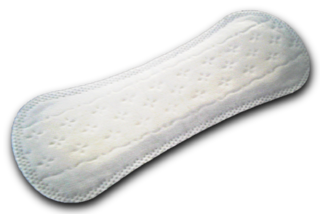
A pantyliner is an absorbent piece of material used for feminine hygiene. It is worn in the gusset of a woman's panties. Some uses include: absorbency for daily vaginal discharge, light menstrual flow, tampon and menstrual cup backup, spotting, post-intercourse discharge, and urinary incontinence. Panty liners can also help with girls who are having discharges and about to start their cycle. Pantyliners are related to sanitary napkins in their basic construction—but are usually much thinner and often narrower than pads. As a result, they absorb much less liquid than pads—making them suitable for light discharge and everyday cleanliness. They are generally unsuitable for menstruation with medium to heavy flow, which requires them to be changed more often.
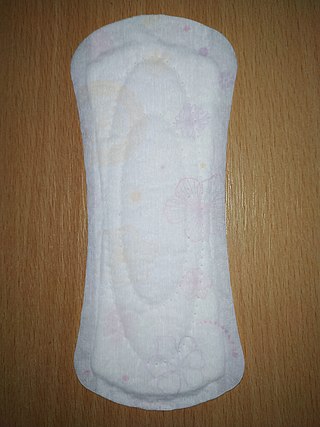
Kotex is an American brand of menstrual hygiene products, which includes the Kotex maxi, thin and ultra-thin pads, the Security tampons, and the Lightdays pantiliners. Most recently, the company has added U by Kotex to its menstrual hygiene product line. Kotex is owned and managed by Kimberly-Clark, a consumer products corporation active in more than 80 countries.

Feminine hygiene products are personal care products used for women's hygiene during menstruation, vaginal discharge, or other bodily functions related to the vulva and vagina. Products that are used during menstruation may also be called menstrual hygiene products, including menstrual pads, tampons, pantyliners, menstrual cups, menstrual sponges and period panties. Feminine hygiene products also include products meant to cleanse the vulva or vagina, such as douches, feminine wipes, and soap.

Playtex is an American brand name for undergarments, baby products, gloves, feminine hygiene products, and sunscreen. The brand began in 1947 when International Latex Corporation (ILC) created a division named Playtex to produce and sell latex products. Playtex was the first to advertise undergarments on national television in 1955, written by Howard Shavelson at Ogilvy and Mather, and the first to show a woman wearing only a bra from the waist up in a commercial in 1977. They developed space suits for the Apollo program.

Renova is a Portuguese company that produces paper consumption goods. It is based in the city of Torres Novas, located in Médio Tejo, a NUTS3 subregion belonging to Centro region. It is one of the most well-known industry brands inside and outside of the country. Their products are sold and advertised in countries like Japan, France, the UK, the United States, Belgium, and Spain.
Always is an American brand of menstrual hygiene products, including maxi pads, ultra thin pads, pantyliners, disposable underwear for night-time wear, and vaginal wipes. A sister company of Procter & Gamble, it was first invented and introduced in the United States in 1983 by Tom Osborn, a mid-level employee at Procter & Gamble, then nationally in May 1984. By the end of 1984, Always had also been introduced internationally in the United Kingdom, Canada, France, Germany, Arab world, Pakistan and Africa. Despite the Always' pads runaway international success, Procter & Gamble almost fired Tom Osborn twice in the early 1980s as he was developing this product.
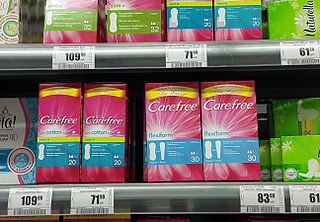
Carefree is an American brand of pantyliners from Johnson & Johnson. In the US, the Carefree brand was formerly marketed by McNeil-PPC and currently being marketed by Edgewell Personal Care.

Cloth menstrual pads are cloth pads worn in the underwear to collect menstrual fluid. They are a type of reusable menstrual hygiene product, and are an alternative to sanitary napkins or to menstrual cups. Because they can be reused, they are generally less expensive than disposable pads over time, and reduce the amount of waste produced.
Arbora & Ausonia was a company that dealt in the manufacturing and sale of absorbent products for the child and family hygiene, feminine hygiene and adult incontinence markets. It fully merged into Procter & Gamble in 2013.

Unicharm Corporation is a Japanese company that manufactures disposable hygiene products, household cleaning products, specializing in the manufacture of diapers for both babies and adult incontinence, feminine hygiene products and pet care products.
Judith Esser-Mittag, commonly known as Judith Esser, was a German gynecologist. Her extensive studies of the female anatomy helped her to create an environmentally friendly tampon with no applicator.

Bella is a brand of feminine hygiene products, including maxi pads, ultra thin pads, and female wipes. Bella is currently owned by Polish company Toruńskie Zakłady Materiałów Opatrunkowych.

o.b. is a brand of tampon, originally developed in Germany in 1950 and manufactured by Carl Hahn GmbH. It is now owned by Kenvue outside of the United States and Edgewell in the US. The product was named by the gynecologist Judith Esser-Mittag who also developed it. The initials o.b. are an abbreviation of the German phrase ohne Binde.

Tampon tax is a popular term used to call attention to tampons, and other feminine hygiene products, being subject to value-added tax (VAT) or sales tax, unlike the tax exemption status granted to other products considered basic necessities. Proponents of tax exemption argue that tampons, menstrual pads, menstrual cups and comparable products constitute basic, unavoidable necessities for women, and any additional taxes constitute a pink tax.
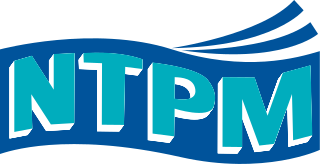
Nibong Tebal Paper Mill Holdings Bhd. is a Malaysian multinational pulp and paper and consumer goods company and is one of the world's largest paper manufacturer. Headquartered in Nibong Tebal, Penang, the company produces more than 100 types of tissue papers and has a capacity to produce 250 tons of tissue paper per day. Nibong Tebal Paper Mill has a strong presence not only in Malaysia, but also in Singapore, Indonesia, Thailand, and Vietnam.
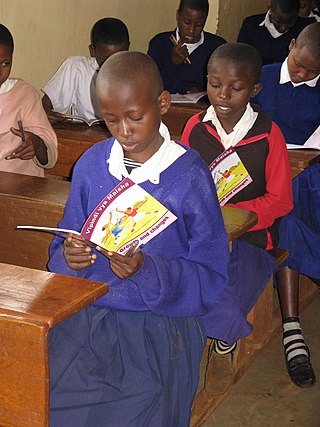
Menstrual hygiene management (MHM) or menstrual health and hygiene (MHH) is the access to menstrual hygiene products to absorb or collect the flow of blood during menstruation, privacy to change the materials, and access to facilities to dispose of used menstrual management materials. It can also include the "broader systemic factors that link menstruation with health, well-being, gender equality, education, equity, empowerment, and rights". Menstrual hygiene management can be particularly challenging for girls and women in developing countries, where clean water and toilet facilities are often inadequate. Menstrual waste is largely ignored in schools in developing countries, despite it being a significant problem. Menstruation can be a barrier to education for many girls, as a lack of effective sanitary products restricts girls' involvement in educational and social activities.

Period underwear are absorbent garments designed to be worn during menstruation. Period underwear is designed like conventional underwear but it is made up of highly absorbent fabrics to soak up menstrual blood. Most commercially manufactured period underwear makes use of microfiber polyester fabric. It is recommended that period underwear should be changed every 8-12 hours to avoid leakage and infection.
Natracare is a British feminine hygiene brand that produces organic and plastic-free menstrual products, including tampons, sanitary pads and panty liners.
















